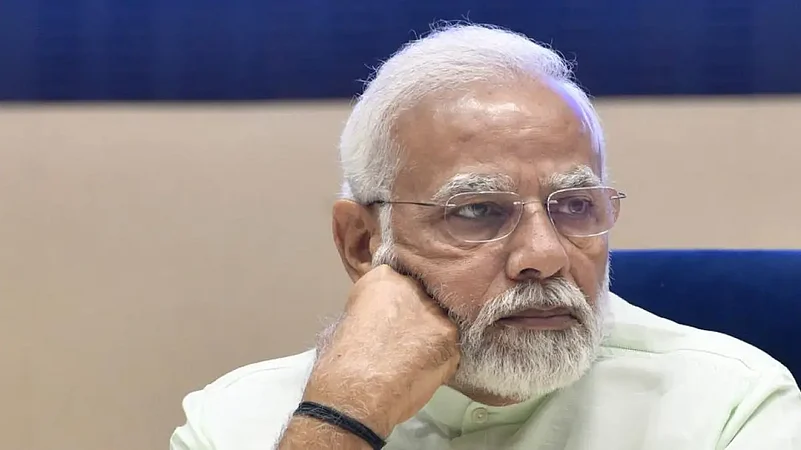The Government of India and Bharatiya Janata Party (BJP) have now spent two days in efforts to contain the international fallout of former BJP functionaries' comments on Prophet Mohammed as West Asian countries register strong protests and convey expectation of public apology from New Delhi.
Public anger in West Asia has spilled into reports and calls of India's economic boycott, resulting in some stores taking Indian products off their shelves.
While the BJP issued a statement denouncing insults of any religious personality and suspended spokespersons Nupur Sharma and Naveen Kumar Jindal, the Ministry of External Affairs issued conciliatory statements to placate West Asian countries as Qatar, Kuwait, and Iran summoned Indian ambassadors there.
Besides governments, several prominent personalites such as the Grand Mufti of Oman, the country's highest religous authority, made strong comments on the issue.
Here we see how the foreign press covered the episode, ranging from the comments to the exceptional reaction by West Asian countries.
Qatar
Qatar's oldest English daily Gulf Times put the country's condemnation of BJP functionaries' comments on Prophet on its front page, devoting the entire above-the-fold part to it.
In its lead stories, the paper reported on the foreign ministry's summoning of the Indian ambassador there and the strongly-worded note protesting against the comments.
Besides the first page, page eight was also devoted to the subject, with three stories covering the reaction of people on the internet on these comments and actions of Pakistan protest, Kuwait, and Organisation of Islamic Cooperation in the matter.
Hashtags calling for the boycott of Indian products were also trending on Twitter, reported the paper.
Saudi Arab
While Monday's edition of Arab News did not carry the news, its website was running a story on the West Asia and Muslim bodies' strong reaction to comments on Prophet Mohammed as their main story.
Besides official statements from West Asian countries, Arab News quoted Egypt's Al-Azhar Al-Sharif, Sunni Islam's most prestigious university, denouncing the BJP functionaries' comments as "a real terrorist action that helps to push the entire world to devastating crises and bloody wars" and calling on the world community "to firmly ward off such threats".
Kuwait
The Kuwait Times ran the story as their front-page lead.
The paper noted, "The Grand Mufti of Oman along with Twitter handles with a large following have called for the boycott of Indian products."
Oman
Oman's Muscat Daily reported the country's government condemning the comments on Prophet Mohammed. It was running the story among its lead stories on the website on Monday night.
It reported that the government expressed condemnation of comments on Prophet Mohammed, Islam, and Muslims, during a meeting of a senior foreign ministry official with Amit Narang, the Indian Ambassador to Oman.
Iran
Iran's official IRNA news agency had the story on the matter as number one in its "most viewed" section on the home page, suggesting its popularity.
Iran International noted that the development came at a time when New Delhi is set to host Iran' foreign minister on his first visit of India.
International press
Reuters
Reuters linked violence in Kanpur with outrage at comments on Prophet Mohammed in its story.
It quoted Qatar's officials as saying that hurting Muslims' sentiments could hurt India's economic relationship with the country.
It reported, "A senior official at the Qatar Embassy in New Delhi said Modi's government must publicly distance itself from the comments. 'Hurting our religious sentiments can directly impact economic ties,' the official said, adding they were checking reports about boycott of Indian goods by some supermarket owners in Qatar."
AFP
The news agency AFP reported stores in Kuwait taking Indian products off the shelves after calls of India's economic boycott.
Western press
The Guardian in its story on the matter highlighted that no action was taken on BJP functionaries until outrage abroad and also accused Indian news channels of allowing anti-Muslim content.
It said, "However, many observers pointed out that the two [Nupur Sharma, Naveen Kumar Jindal] had faced no action when their comments had first been flagged over a week ago by Muslims and civil rights activists in India. Instead there had been calls by BJP supporters for the arrest of the journalist who had called out the Islamophobic comments on social media.
"On India’s rightwing news television channels, anti-Muslim rhetoric is expounded nightly by supporters of the BJP but is rarely, if ever, met with apologies or retractions."
The BBC said the ongoing episode would "test" India's relationship with West Asia. It also highlighted the polarisation in India and noted that Nupur Sharma was not a "fringe element" as the Indian government said but an official spokesperson of the party until Sunday.
It said, "TV channels have held provocative debates and social media has seen rampant hate over the issue. Many people associated with right-wing organisations often make controversial statements on TV shows, but critics say Ms Sharma wasn't a "fringe element" as the BJP has claimed. She was an official spokesperson of the party, tasked with representing the BJP's views."
It quoted analysts as saying the ongoing episode should be a "wake-up call".
The Bloomberg noted "rising anti-Muslim sentiment in India" in their story on the matter and also highlighted how Prime Minister Narendra Modi has been working to improve relations with oil-rich West Asian countries that are now condemning his party.
Bloomberg noted, "The controversy comes amid Indian Prime Minister Narendra Modi’s efforts to boost relations with Middle Eastern countries to secure energy needs of the South Asian nation, which imports 85 per cent of its annual crude oil requirement.
"Their comments are a reflection of rising anti-Muslim sentiment in India, which has become a key part of the BJP’s plan to push its Hindu nationalist agenda."


























